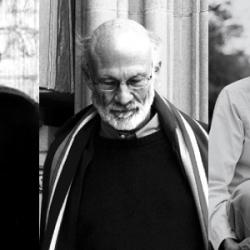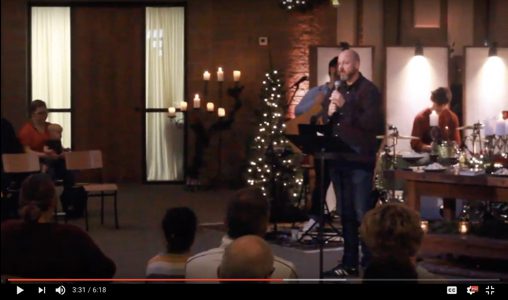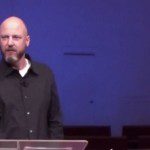Advent season is arriving, which means that many of us who do not follow the lectionary in ordinary time begin to sync back up with it. Each week I’m going to try to put together a few thoughts to help provoke those pastors, students, and theological nerds (meant to be a term of endearment), as they consider the text for this week. The first text comes from Luke 21-25-36
Video/Art:
I love the idea of showing the above video, then reading the text. I think it would make for a provocative opening to a sermon. I would probably cut the video at 1:52, right before the commercial at the end, just to leave it more open to personal interpretation.
Mining for Tension:
When we leave the prophetic passages to what one of my seminary professors called “the charts and graphs folks,” – meaning those who are sure that the prophetic office is about reading the tea leaves, predicting the future, and warning of the end times – we lose the rich tradition of prophetic literature in the Bible. If the first line of the website is “Bible Prophecy,” then we all know what kind of church it is, and many of us will be unlikely to play along. Yet for many of us the pendulum has swung too far the other way. Here’s another article that might help describe the role of the prophetic office.
If this text doesn’t bother you, it should. Jesus says, “Truly I tell you, this generation will not pass away until all things have taken place.” It’s natural to look at this text and be troubled by it. The plain sense of the text seems to be contradicted by history. The natural tendency is to simply not deal with it. When I looked at the lectionary for this week my first thought was to see what was happening in the Old Testament passage or the epistles. I didn’t want a piece of this gospel text. Pastors need to dig into these troubling passages, learn all we can, and give a rich nuanced reading of the text that doesn’t shy away from the obvious issues.
Insights & Understandings:
V. 25-28; When is there not distress? Name an epoch which was distress free. It can’t be done. When are people not fainting from predictions of calamity? Is there a time when there were no prophets of doom and gloom? When are the heavens not shaken with the cataclysmic explosions of a billion burning suns? These are always the case, as they were when the writer of Luke penned these words. So what do we do? Heed the instructions: we stand up, lift up our heads, and look to the redemption which is drawing near.”
V. 29-33; The fig tree is typically a symbol for Israel. V. 32 is likely a reference to the sacking of Jerusalem which had either just happened, or was about to when Luke’s gospel was written. In that sense the generation did not pass away before Jerusalem was “judged” by God and Israel scattered.
“This generation,” could mean Israel, the wicked, all of humankind, or something else. The prophets always speak with the voice of expectation. It’s likely that the prophets, Jesus, and Luke expected the end of all things to come before their own generation passed. Still the fact that history continues has never invalidated the words of the prophets, and it doesn’t invalidate Jesus here. The warning of judgment on the wicked, or assurance of redemption for those who are faithful is the central idea of the text. Why? Because it is a mad world.
V. 34-36; It’s a mad world, and every life comes to an end. The ungodly resolve to make the most of every moment with out reference to their neighbor, or to the common good. They live for the moment; they live for themselves. In our day this is typically done in the name of freedom, personal rights, and enlightened thinking. The obvious problem is that this kind of life has a sense of meaninglessness. It lacks a sense of transcendent purpose. On the other hand, the Godly resolve to make the most of every moment not in order to please themselves, but to please their Father in heaven and to live in Jesus’s name. The Godly resolve to love their neighbor and seek the common good in the name of Jesus. This kind of life has a profound meaning, discernable both to the person living this life, and to the community at large. It is not only how we experience a rich, deep, full, abundant life, but it is also how we bear witness to the ultimate lordship of Jesus.
The point of the passage isn’t to read the tea leaves and predict the date of the second coming. That misses the point entirely. The point of the passage has much more to do with the way that we live our lives right now. “Stand up and raise your heads, because your redemption is drawing near…Be on guard so that your hearts are not weighted down with dissipation and drunkenness and the worries of this life… Watch and pray,” this is the life of the disciple. Do this “that you may be able to stand before the Son of Man,” when your life, when all of life, finds its culmination in God. Do this and your lives will bear witness that the kingdom of God is a kingdom of love, a kingdom of joy, a kingdom of peace, and a kingdom of hope.












